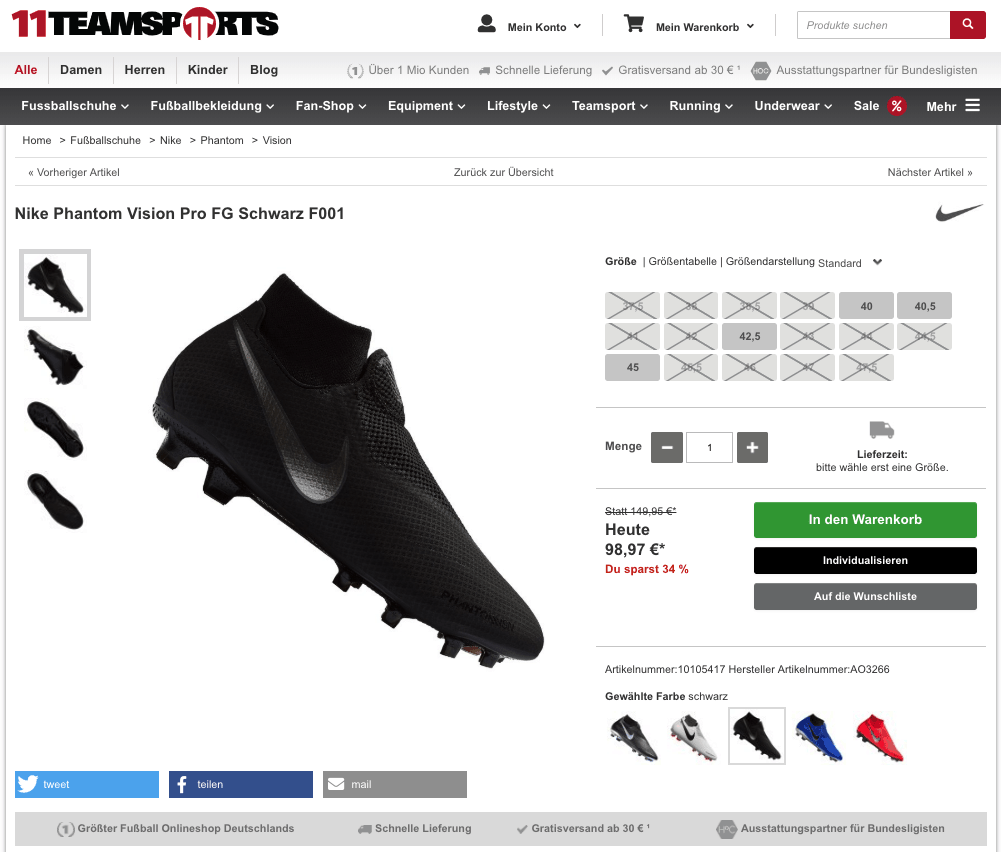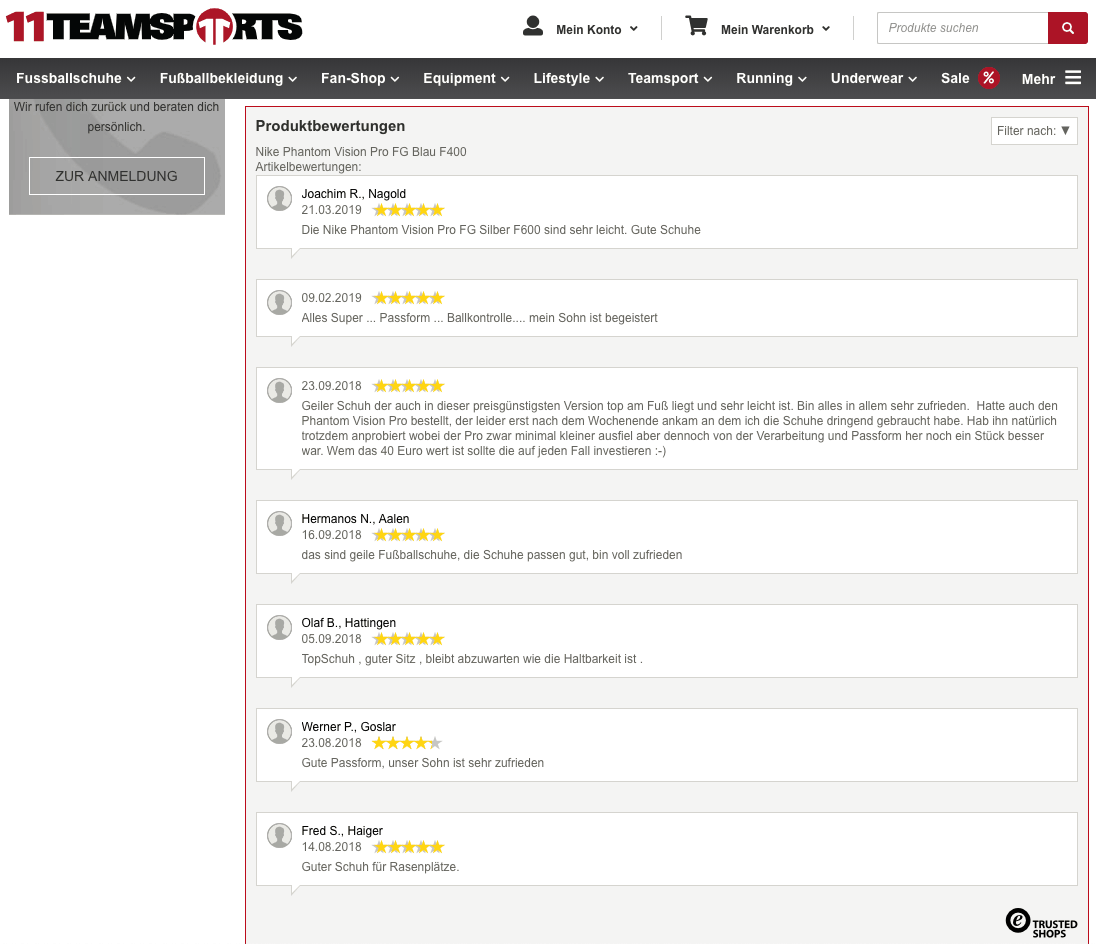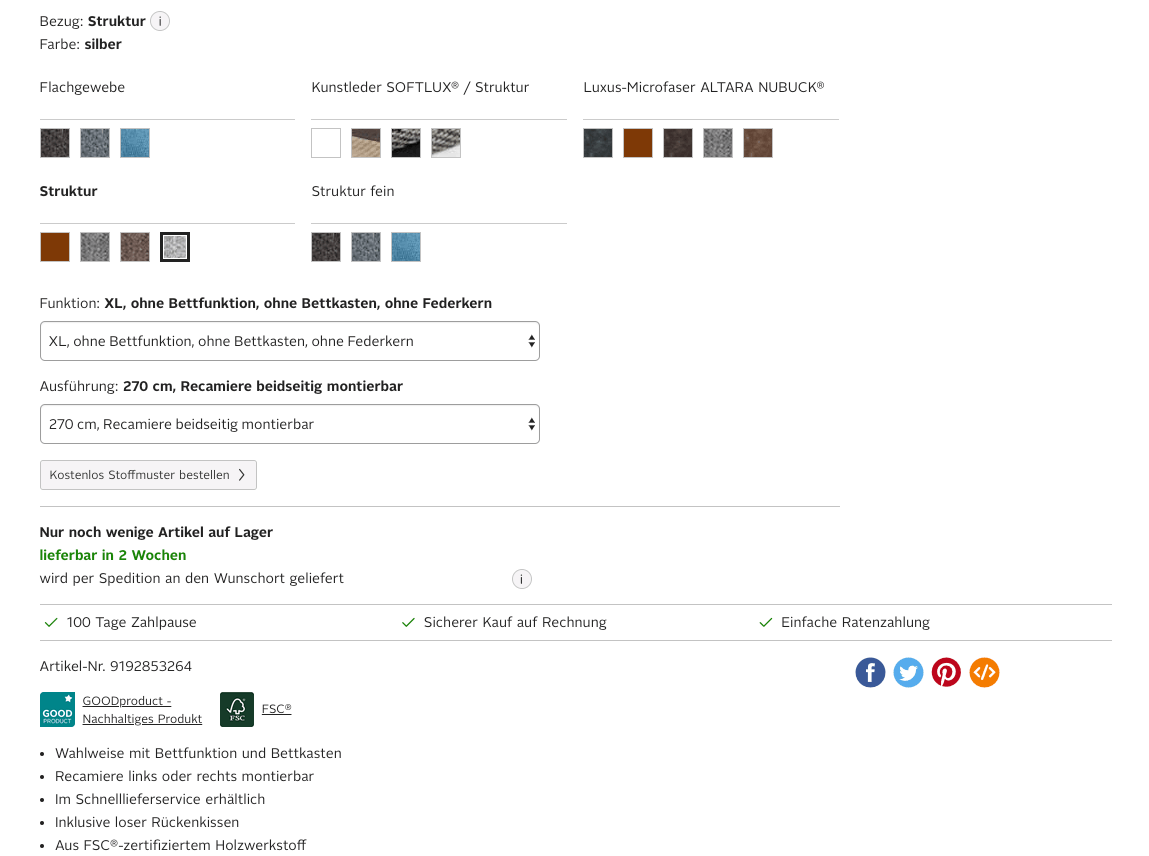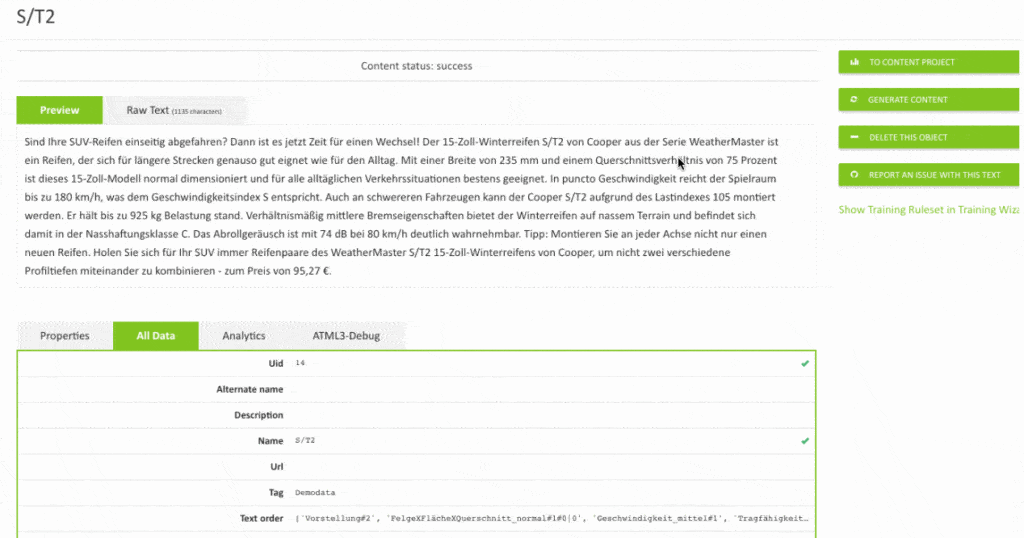The best tips and examples: Create perfect product descriptions

In a survey conducted by statista, 62% of more than 1,000 respondents stated that they consider meaningful product descriptions to be very important and that they thus strongly influence the purchase decision when shopping online. Thus, this was the most important factor. Product images and videos only came in second place with 42%. How much attention have you paid to creating your product descriptions so far?
In this guide, we would like to look at the product descriptions with you from every angle. In return, you will receive examples of what they look like in the best case, what sales-boosting optimization possibilities exist and how you can automate them.
Let’s start with a little overview for you of what you’ll learn here about product copywriting:
Contents
- Product descriptions: Definition and purpose
- Structure of sales-boosting product pages (incl. examples)
- Content of good product texts
- 3 tips to create optimal item descriptions
- Checklist: These 5 tips are what copywriters should look out for!
- Product texts from a customer vs. SEO perspective
- Automate description texts
- FAQ about product descriptions and advertising texts
What is the purpose of product descriptions?
Basically, article descriptions can be found on the product pages. As detailed product descriptions, they contain technical or descriptive data of an article. Specifically, a product description serves to inform potential customers about the quality, characteristics or function of an article.
Experiencing with all senses? This does not (yet) work for online purchases. This is exactly why these sales-promoting product texts are so important: together with the product images or product videos, the product description creates a realistic, positive impression of the item. This also makes clear the purpose of descriptive texts: to inform, to describe and to convey an image of the product.
A tonality suitable for the context additionally strengthens the trust for the online store and the product and can positively influence the purchase decision.
In addition, customers should be encouraged to purchase the item exactly from this – your – store. This also explains why this can’t just be about promoting the item. Building a relationship of trust is much more important. Eventually, it’s all about marketing and search engine optimization (SEO for short). Unlike in a brick-and-mortar store, the prospective customer only has a screen in front of him.
Well written product descriptions have two aims:
- They are intended to increase conversion (read: purchases in the store). Because only a well-informed customer buys. In concrete terms, this means that all the questions he or she has about the item are answered in the product description.
- They are supposed to reduce the rate of returns. If the return rate of the product is significantly above average, the buyer is obviously missing relevant information in the product description.
Reduce the rate of returns with your product descriptions
Did you know that in Germany in 2018, around 280 million parcels and 487 million items were returned after being ordered online? That corresponds to one in six orders, as the WELT also reports.
A recent study by the Returns Management Research Group at the University of Bamberg shows just how enormous the costs of a return can be. They cost on average 19.51 euros. This results in total costs of 4.6 billion euros – which both retailers and customers have to bear.
Particularly alarming is the fact that around 30% of customers return goods because they do not correspond to the product description. This alone is reason enough for a good and informative article description – as also emerged from the following survey.
Survey: Which three factors have the highest influence on the return rate?
(multiple answers possible; n=297; source: e-commerce guide)
- Detailed product description 85%
- Professional packaging 47%
- Short delivery time 45%
- Offer of assistance 39%
- Product rating by buyers 19%
- Small additions to the delivery 8%
- Rewarding customers who return little 4%
- Miscellaneous 2%
Here, the automatic text generation of product texts with a text robot helps immensely. With its help, you dramatically reduce time, costs and effort compared to manual texting and at the same time increase the quality of product descriptions. On top of that, the rate of returns drops.
We explain to you what is important for a good description text:
Tips: What must be in an item description?
When formulating perfect, search engine optimized product descriptions on a product page, copywriters should pay particular attention to the following elements:
- Product name as headline: It should be meaningful and contain the most important aspects and, if necessary, keywords to guide your customers.
- Product text or detailed article description: The content and approach should fit the target group and be meaningful, highlighting as precisely as possible the appropriate product characteristics and features in a positive way, and in the best case stand out from the competition through unique selling points. Longer descriptive texts should be thematically appropriately separated by paragraphs.
- Technical data: With very technical products, many prospective customers only skim the texts and bullet points. The product features are therefore best presented in the form of comprehensible tables or lists, where the focus is clearly on the benefits for your customers.
- Images and videos: The media used should be of high quality and show the respective product from different sides as well as in use. Often, the most important key data is also inserted in a suitable place in the images or product videos.
- Ratings and test results: These aspects support the customer on the one hand and build trust on the other.
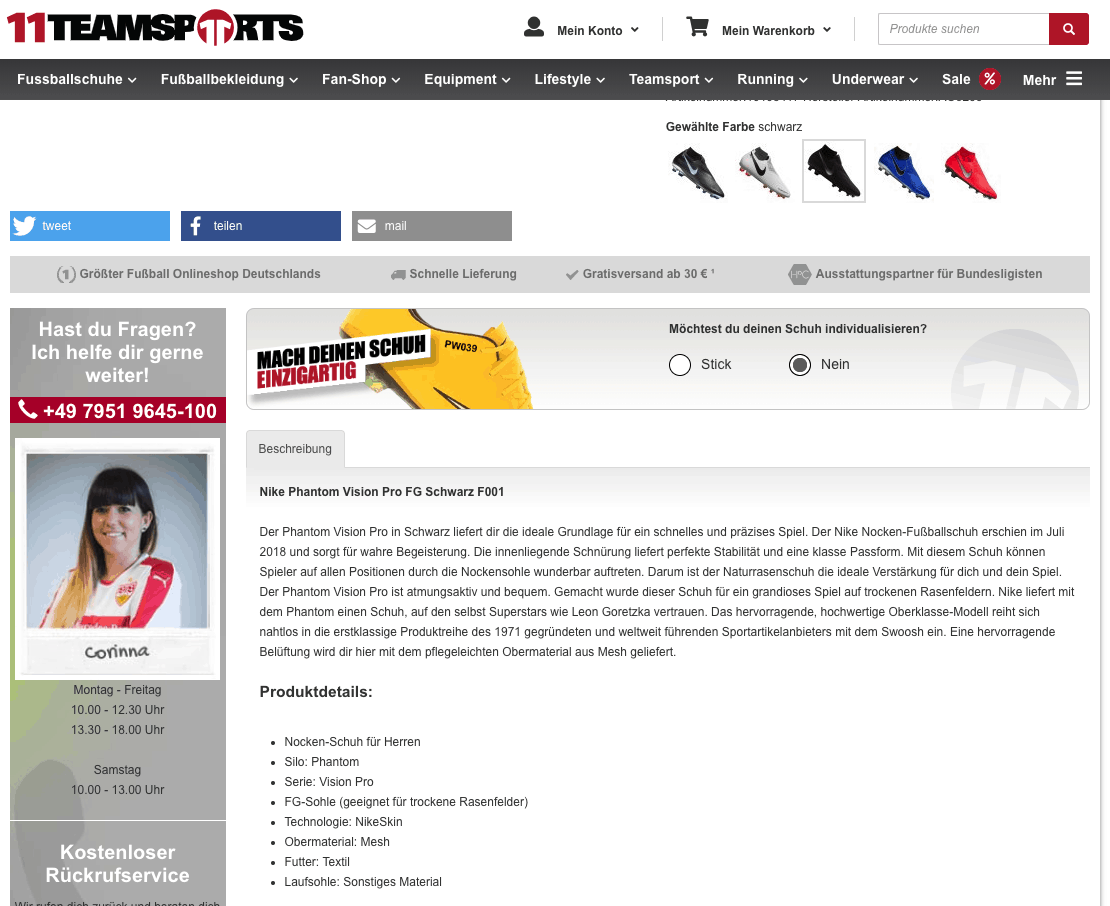
If the customer scrolls down further in the product description, he gets all the product features relevant to him at hand. The product is described in detail in a continuous text of 100 to 200 words. What’s more, in this case additional trust is created, as it is also indicated which superstar is wearing the shoe. This is followed by a listing of the most important information nicely summarised in the form of Bullet Points.
What do product descriptions look like in terms of content?
Let’s have a look at the content of a product description in detail: A product description should inform about everything the customer needs for the purchase decision and answer all questions on the product detail page of the store. The customer should only have to leave the product page for specific product details (such as descriptions of a complex technology), but under no circumstances should they have to leave your online store.
The content of sales-boosting product texts depends heavily on the product groups and the range of goods. If you are looking for a current smartphone or notebook, you will naturally look more for technical data. In contrast, pictures and descriptive adjectives play a greater role for potential customers, especially in categories such as clothing or shoes. Feel free to check out our examples in this post for that.
In the case of visually detectable products (e.g. clothing), the most important facts (advantages as well as disadvantages) are also presented in written form – such as details of the outer and inner materials, shape, type and texture, collar, pockets and fastenings, heel shape, care instructions, patterns and colors.
This not only gives customers a better choice, but is also important in the interest of search engine optimization. Because: Well-prepared product descriptions as SEO text demonstrably help to improve the ranking in the search results on search engines such as Google. As a result, they increase the conversion rate at the end of the day and the return rate is demonstrably reduced.
The product text can contain promotional elements, which can then be prepared specifically for the target group. However, the optimal article text should above all answer the potential questions of the customers.
Practical tips: comparative text and tables
Technical data and descriptive properties of the product, as you can find them in the data sheets, can also be decisive for another reason. In the consumer electronics trade in particular (especially notebooks and smartphones), retailers use the data sheets to create comparison pages that clearly show the differences between the products.
In addition – and this goes a step further – retailers also generate complete product descriptions for their product detail pages from the differences with the help of a text robot. And this across all industries and product types. This way, product descriptions can also be created automatically for the various output channels, be it for the online store, marketplaces such as Amazon or eBay, newsletters or even for a blog.
What else applies to the content?
Honesty reduces the return rate
An article description should attract interested people, that’s logical. Emotional product texts and outstanding positive features help to win over potential buyers.
But…
Do you also think about the disadvantages of your products? Nobody likes to talk about them and yet they are elementary – already in the product description! If you play with the wrong cards from the start and withhold invisible disadvantages from the buyer, you will have to reckon with returns.
Take, for example, a refrigerator that meets all the positive qualities of the prospects… if it were not for the volume, because of which it can only be placed in the basement. Although the product details state the volume in the form of dB, who can really do anything with this abstract number?
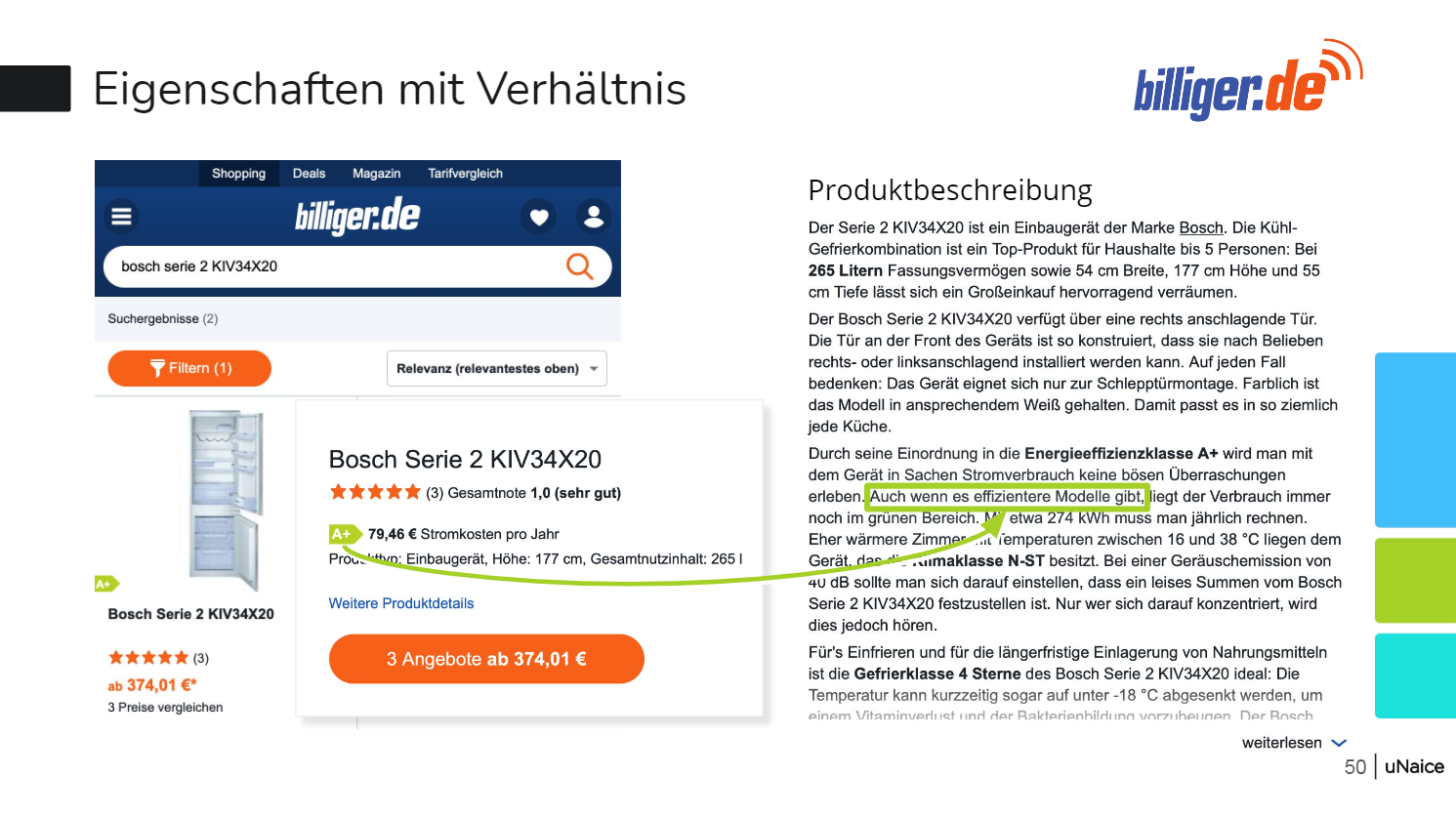
The buyers will notice this disadvantage at the latest when they start using the device. The logical consequence: if the refrigerator was intended for the kitchen, it is returned. Your returns are increasing – the reason? Always the same.
This is often another consequence of dissatisfied customers: Hidden or not clearly communicated disadvantages lower the authenticity and possibly deter from buying something again in the online store or from the online retailer.
That’s why it’s worth taking a closer look at your return slips: Is there one or more reasons that are cropping up more often? Do they match the characteristics of the product? If not, you should include that in your description text.
In our refrigerator example, the following sentence could already suffice for the product:
“Because of its volume of 85 dB, this model is better off in the basement than in the kitchen.”
Therefore: rather honest in the product text instead of hidden disadvantages! Emotions are good and important, but they don’t do your customers much good if they give your products the wrong image. Think about all the facts, not just the merits.

The rules are changing. Are you ready?
3 basic rules: Create optimal product description
Information
Detailed product descriptions inform customers about the benefits, functions and added value of the product. Product descriptions with added value tip the scales in cases of doubt – especially if the customer is still unsure before buying and finds the same product at several suppliers. That’s why the invested time is worth it.
Efficiency
When it comes to product texts and advertising copy, less is more in view of the customer’s limited attention. This applies in particular to the description in the body text: This should be as detailed as necessary in terms of content, but as short as possible in terms of length. This is especially true for the mobile version of the web store – simply because the smartphone screen offers less space than a monitor or notebook.
Linguistic style
Product descriptions that are tailored to the needs of the potential target groups create the necessary trust and provide interested parties with the product information that is relevant to them. This leads to more credibility towards the seller. And ultimately to a higher conversion rate and higher sales in the online shop.
Checklist product texts – These 5 tips are important for copywriters!
What should a product description look like? Advanced, pay attention
Outsource information: You will be able to assume that some of your customers know certain (often technical) terms, but you will have to explain them to another part of the target group. Work here with linking and anchor texts on your product pages so that you cater to both audiences.
Product text with bullet points: The classic design rule that you should offer the:visitor:in numerous entry points can also apply to your product detail page or to promotional text. Highlighting the most important information clearly with bullet points, in list form or by bold in the product text can be an advantage, especially if it is a mobile store. Eye tracking studies show that well structured text leads to a higher conversion rate.
Test different variants: Preparing a product description to suit the target group can be done manually or with the help of automation tools. Try out different variants (A/B tests) and measure the respective conversion rate on the basis of randomly generated variants. A created product description that doesn’t work at first glance may work well with a different target audience.
Use social media: Make sure that customers can report on your products easily and with just a few clicks on social media. Facebook and Twitter in particular, but also Instagram and Snapchat are important networks in ecommerce that are well suited for sharing. Create incentives for storytelling and let customers talk about your products, for example in connection with competitions.
Practical tips: How to get the optimal article text on your product page with testing
A shoe mail order company knows that special series of certain sneaker models are in high demand among a certain young target group. However, this is not associated with positive (“hip”) brand awareness for your shop. So an additional shop can be created with a small but suitable product selection for the target group.
This micro-site will contain a lot of images and less product text, but will feature elaborate video content. Here, the added value of good testing became apparent because the experienced e-commerce team had not anticipated certain details.
Example 2 for good description texts
Look at product descriptions from the customer’s perspective – and from the SEO point of view.
What will your target audience be looking for, interested in? On the one hand, this question must be answered in terms of content, and on the other hand, it must also be answered in terms of concrete concepts. Because you write primarily for your customers and only then for the most important search engines (i.e. Google or Amazon). The good thing about this is that Google’s and Amazon’s goal of ensuring that visitors to your product detail page efficiently find the information and features of a product that are relevant to them is identical to the interests of your customers. Thus, there is no difference between product texts for the search engine and for visitors.
To make it easier for the search engine robots (as well as for your customers), you should name the elements according to the common guidelines, especially stick to the headline architecture. Each page should have exactly one heading H1, while subheadings (H2 and H3) can follow similar logical rules as in a printed document or term paper. The structure should be reflected in the navigation level and sidebar. The footer structure should also contain headings and be structured hierarchically.
These headlines are not only an end in themselves and a guide for the visitors, they also offer you the further benefit of placing the important SEO keywords. The main purpose of these is to ensure that your product description appears as high up as possible in Google’s search results (the search results list, SERP) in the right search environment and is seen by potential customers.
Advice: Good store systems allow a clean definition of text elements. Use this, if possible, database-driven with the help of existing Attributes to generate your product texts. So in the medium term you can use text robots create texts automatically. Here we can support and advise you. Just talk to us!
Align the created product descriptions to mobile as well
When designing your product page, think separately about the desktop version and the mobile version of your web store. Almost every third purchase in Germany now takes place via a mobile device (32 percent, according to IntelliAd Media). The share of purchases done via smartphone continues to increase. Since 2018, mobile traffic in ecommerce has overtaken desktop traffic.
By now at the latest, every online retailer should have turned their attention to the mobile channel. Depending on the target group and product category, you will already receive more than half of all hits and / or sales from mobile devices. For this you should have a special mobile store, which should also be structured differently than your classic web store.
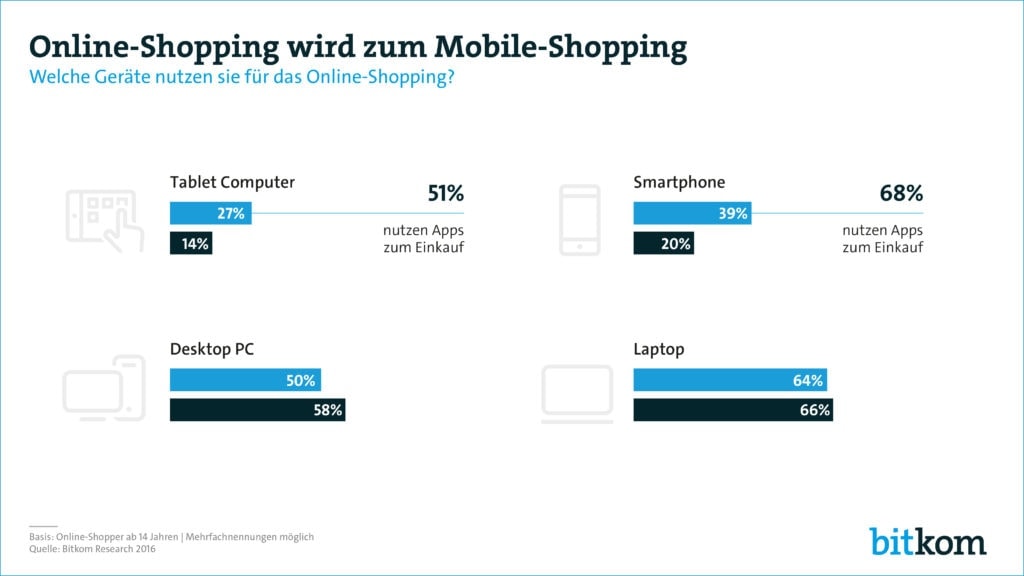
The percentage of online purchases via mobile devices is rising steadily. Use a Text Robot to automatically create the necessary variants for different devices.
The advantages and disadvantages of responsive web design are close together:
By the way, Google regularly recommends the use of responsive design also and especially in e-commerce or webshops. Operators of online stores should pay particular attention to Google’s mobile-only index, which has been in place since 2021.
Important: Pay attention to the correct layout of the individual modular elements, text blocks and headings (including subheadings).
This also has an impact on the structure of the product description: You should work with shorter text blocks for better readability online and go from the important to the detailed even more strictly than you already do. Only a few customers read the entire product text or scroll to the end. In addition, it is more difficult for readers to identify and compare different products on a smartphone, and the reading situation is often different. Rather rely more on a modular structure of the product description and work with tables.
What are your biggest challenges in content production?
(multiple answers possible; n=112; source: uNaice survey)
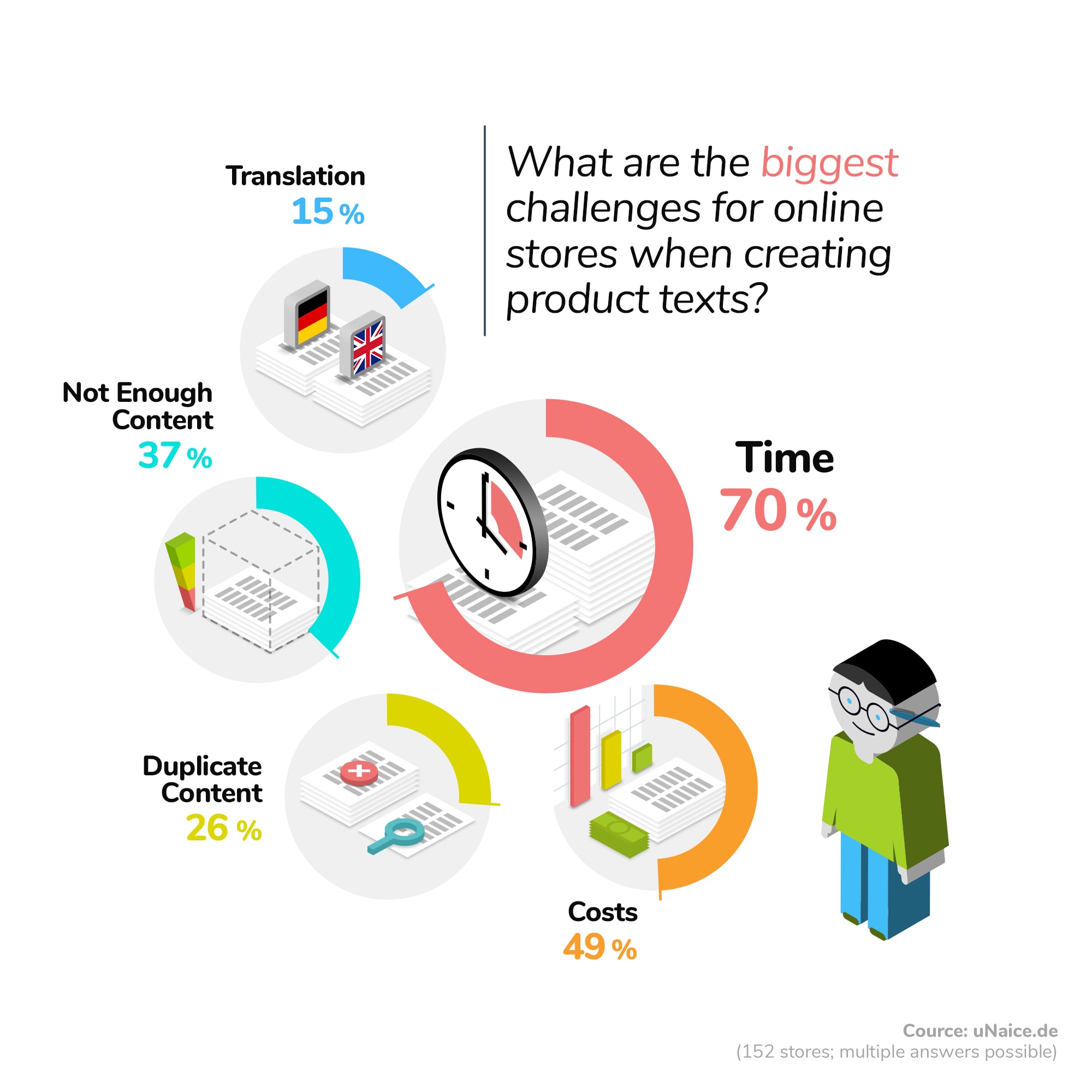
Writing texts: way back when – yesterday – today!
The next step: Automatically created product descriptions
Do you already have a well-maintained database with all the properties of all the products? Congratulations – you are further ahead than 90 percent of your competitors. This is because such a database can be used to systematically create content such as advertising texts and product descriptions automatically – even for large product ranges and in different languages.
Automatically generated product descriptions can be created according to fixed rules – or varying according to different sets of rules. Unlike a traditional translation service, the quality of the foreign language text variants is always consistently good. In addition, the text robot saves you time and money, since your entire product range can be generated within hours in another language, and in this SEO-optimized, after the default settings are made.
FAQ about product descriptions and advertising texts
How long should SEO text be?
Experts, marketers and content producers have been arguing about the optimal text length for product texts for years. Today, it is widely agreed that there is no such thing as the optimal length of a created product description. The top ranks for queries in the e-commerce context are usually occupied by well-optimized web stores with product descriptions that are not too short.
This has to do with the fact that longer texts are often more complex and contain the relevant terms and keywords. So, it’s more about depth than length – and an appealing text that meets the necessary criteria as split content is difficult to create with just a few sentences.
In the context of article descriptions and product texts, it will therefore always be important to answer the relevant questions about the product. You should provide the target audience with the information they need to form a comprehensive opinion. Thus, a good product description reaches a certain length anyway, so there is no need to artificially “inflate” it. Use simple and natural language to convey the right images to your customers, for example by using adjectives.
What role does keyword density play?
Keyword density refers to the frequency of a particular term in relation to the total number of words in a text.
While many experts used to have precise ideas about what keyword density is ideal for content (2.5 is a common value here), it is now known that this element is important, but, as is so often the case in search engine optimization, it depends on a variety of factors.
Therefore, write easy-to-read texts and make sure that the most important terms appear frequently, but not penetratingly so. Keep in mind that it makes more sense to optimize a text for several important terms instead of just trimming it for a single keyword. Don’t get too tangled up with synonyms, though, but choose the most important terms.
What is WDF * IDF ?
WDF * IDF is the ratio that describes how a text compares to other texts in the same topic field. With the help of the WDF * IDF analysis you will learn which additional keywords you can use to be found as well as possible.
Similar to the classic measurement of keyword density, it is not about exact numbers, but about the research possibility of suitable terms.
What is the role of bolding and highlighting?
It is not certain whether bold or italicised terms are given more SEO attention. What is clear, however, is that terms that are highlighted in some way in a longer text stand out more to readers.
Here you should take into account that it makes no sense to write primarily for a search engine, but rather for your customers. Highlighted text passages help readers find their way through the text, meet their expectations, and better remember the relevant content.
The optimal product description, the ideal design of the web shop
If you’re not yet ready to have a fully usable database of all items and features – and that’s much more likely – feel free to talk to us about the next steps on the road to optimal product description.
With our years of experience from various customer projects, we systematically analyze your needs and thus increase your conversion rate step by step. Are you unsure about the quality of your article texts, do you need support with the editorial design of SEO texts? We analyze your webshop and advise you on automated item descriptions.
Conclusion: Descriptive texts replace personal advice in online shopping and can therefore influence the purchase decision positively, but also negatively. Pay enough attention to the creation of your product descriptions and get the most out of them. To ensure that the mass is not lost among all the quality, text automation can be useful.

